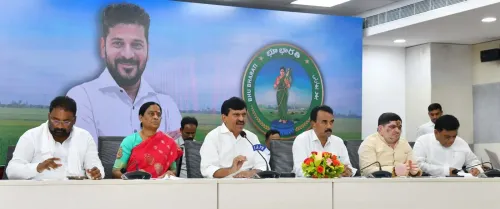What Key Decisions Did the Assam Cabinet Approve for Industrial Growth and Indigenous Land Rights?

Synopsis
Key Takeaways
- Approval of industrial projects to boost economic growth.
- Land rights for indigenous families are being prioritized.
- Teacher regularization initiatives enhance job security.
- Empowerment of ethnic communities through autonomous councils.
- Government commitment to social justice and equitable development.
Guwahati, Oct 23 (NationPress) In a series of important policy initiatives focused on fostering inclusive development and administrative reform, the Assam Cabinet convened on Thursday to approve various measures addressing industrial growth, land rights for indigenous families, teacher welfare, and the empowerment of ethnic communities.
Chief Minister Himanta Biswa Sarma revealed that the Cabinet sanctioned an increase in the project cost for the 500 TPD Methanol and 200 TPD Formalin project of Assam Petrochemicals Ltd to Rs 2,267.22 crore.
This advancement is anticipated to stimulate industrial growth, generate job opportunities, and fortify the state’s petrochemical infrastructure.
In a significant move to safeguard the rights of landless indigenous families, the Cabinet approved 224 proposals under Mission Basundhara 2.0 for the distribution of land pattas.
This initiative aims to address long-standing land issues and guarantee fair access to land resources among indigenous communities.
Shifting focus to the education sector, the Cabinet approved an amendment to The Assam Elementary and Secondary Schools Teachers’ (Regulation of Posting and Transfer) (Amendment) Bill, 2025, which will soon be introduced to the Assam Legislative Assembly.
This amendment aims to create a structured framework for teacher transfers and regularization. Upon implementation, the new policy will allow nearly 12,000 contractual teachers serving under the Sarba Siksha Abhiyan (SSA) to apply for regularization, a change expected to enhance job security and administrative efficiency.
To support the welfare of the Moran and Matak communities, the Cabinet also approved the introduction of the Matak Autonomous Council (Amendment) Ordinance, 2025 and the Moran Autonomous Council (Amendment) Ordinance, 2025 in the upcoming Assembly session.
This action is part of the government’s ongoing commitment to empower indigenous communities through increased administrative and developmental autonomy.
In a landmark decision, the Cabinet also supported the presentation of the long-awaited Tiwari Commission Report regarding the 1983 Nellie Massacre in the next session of the Assam Legislative Assembly.
This report, which has remained unpublished for years, is expected to illuminate one of the most tragic episodes in Assam’s history. These decisions signify the government’s persistent focus on industrial development, social justice, and inclusive governance, as stated by the Chief Minister.









